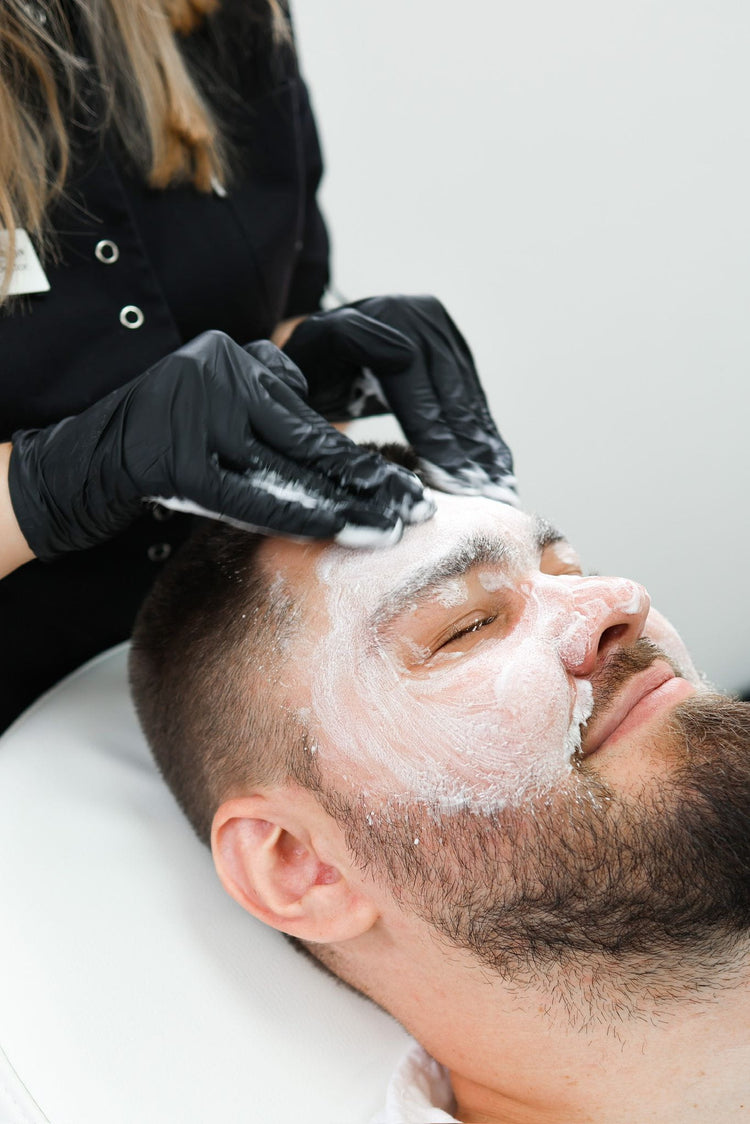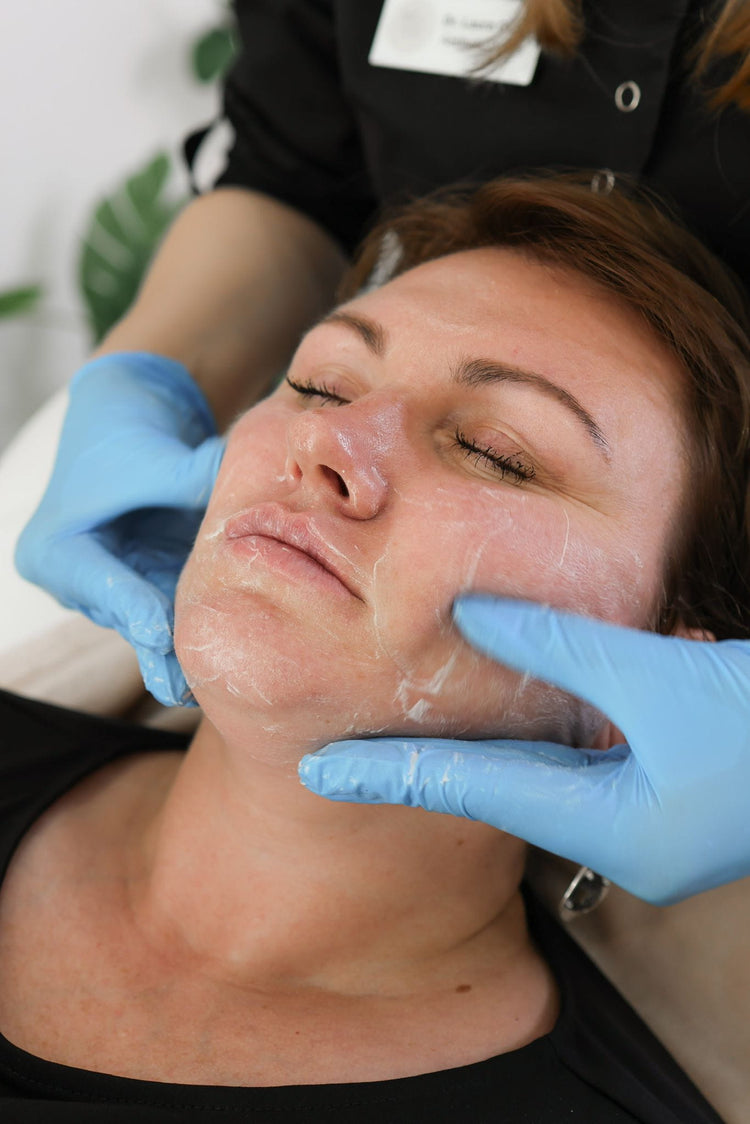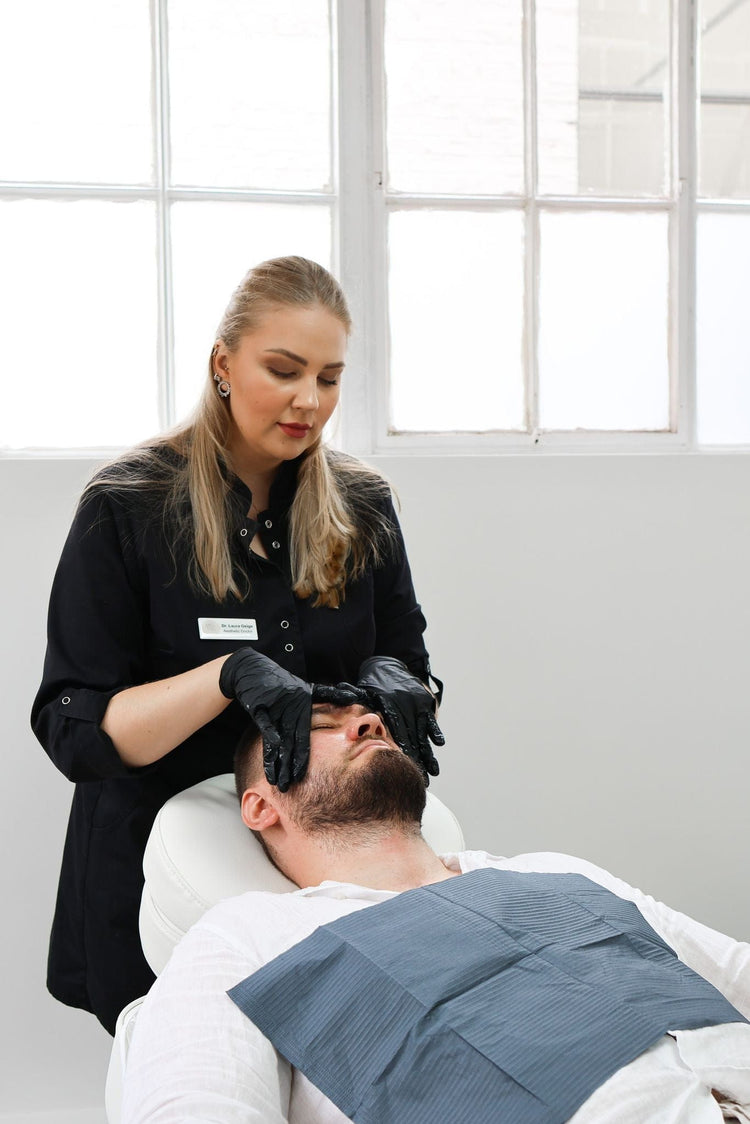Understanding Hyperpigmentation
Hyperpigmentation, characterized by darkened patches of skin, can affect individuals of all skin tones. This common concern often stems from sun exposure, hormonal changes, or post-inflammatory marks. While various over-the-counter products exist, a personalized skincare consultation can provide valuable insights and tailored solutions for effectively addressing hyperpigmentation and achieving a more even complexion.
Causes of Hyperpigmentation
Hyperpigmentation, characterized by darkened patches of skin, can affect individuals of all skin tones. This common concern often stems from sun exposure, hormonal changes, or post-inflammatory marks.
A skincare consultation can be incredibly beneficial for understanding and treating hyperpigmentation because it allows a professional to assess your specific skin concerns and recommend personalized solutions.
- Expert Analysis: A dermatologist or esthetician will examine your skin, identify the type of hyperpigmentation you have (e.g., sun spots, melasma, post-acne marks), and determine its underlying causes.
- Customized Treatment Plan: Based on their assessment, they can create a tailored treatment plan that may include a combination of topical creams, chemical peels, laser therapy, or other procedures.
- Product Recommendations: A skincare professional can guide you towards effective over-the-counter products containing ingredients like vitamin C, retinol, or kojic acid, which are known to help fade hyperpigmentation.
- Lifestyle Advice: You’ll receive valuable advice on sun protection, proper skincare practices, and other lifestyle factors that can contribute to or worsen hyperpigmentation.
Types of Hyperpigmentation
Hyperpigmentation occurs when certain areas of the skin produce more melanin than others, resulting in darkened patches. These patches can appear as freckles, age spots, sunspots, or melasma, and they can affect individuals of all skin tones.
There are several types of hyperpigmentation. Sun spots (also called solar lentigines) are small, flat brown spots that develop due to prolonged sun exposure. Melasma is a form of hyperpigmentation that causes darker patches, often on the face, triggered by hormonal changes during pregnancy or menopause.
Post-inflammatory hyperpigmentation arises after skin inflammation from acne, injury, or eczema. These dark marks fade over time but may persist for months or years.
Benefits of a Skincare Consultation for Hyperpigmentation
Hyperpigmentation, characterized by darkened patches of skin, can impact individuals across various skin tones. This prevalent concern often originates from sun exposure, hormonal fluctuations, or post-inflammatory marks left behind after skin inflammation. While over-the-counter remedies exist, a personalized skincare consultation offers valuable insights and customized solutions for effectively addressing hyperpigmentation and achieving a more even complexion.
Personalized Treatment Plans
A skincare consultation can be incredibly beneficial for understanding and treating hyperpigmentation because it allows a professional to assess your specific skin concerns and recommend personalized solutions.
- Expert Analysis: A dermatologist or esthetician will examine your skin, identify the type of hyperpigmentation you have (e.g., sun spots, melasma, post-acne marks), and determine its underlying causes.
- Customized Treatment Plan: Based on their assessment, they can create a tailored treatment plan that may include a combination of topical creams, chemical peels, laser therapy, or other procedures.
- Product Recommendations: A skincare professional can guide you towards effective over-the-counter products containing ingredients like vitamin C, retinol, or kojic acid, which are known to help fade hyperpigmentation.
- Lifestyle Advice: You’ll receive valuable advice on sun protection, proper skincare practices, and other lifestyle factors that can contribute to or worsen hyperpigmentation.
Expert Advice and Guidance
Hyperpigmentation, characterized by darkened patches of skin, can affect individuals of all skin tones. This common concern often stems from sun exposure, hormonal changes, or post-inflammatory marks. While various over-the-counter products exist, a personalized skincare consultation can provide valuable insights and tailored solutions for effectively addressing hyperpigmentation and achieving a more even complexion.
A skincare consultation can be incredibly beneficial for understanding and treating hyperpigmentation because it allows a professional to assess your specific skin concerns and recommend personalized solutions.

- Expert Analysis: A dermatologist or esthetician will examine your skin, identify the type of hyperpigmentation you have (e.g., sun spots, melasma, post-acne marks), and determine its underlying causes.
- Customized Treatment Plan: Based on their assessment, they can create a tailored treatment plan that may include a combination of topical creams, chemical peels, laser therapy, or other procedures.
- Product Recommendations: A skincare professional can guide you towards effective over-the-counter products containing ingredients like vitamin C, retinol, or kojic acid, which are known to help fade hyperpigmentation.
- Lifestyle Advice: You’ll receive valuable advice on sun protection, proper skincare practices, and other lifestyle factors that can contribute to or worsen hyperpigmentation.
Product Recommendations
Hyperpigmentation, characterized by darkened patches of skin, is a common concern that affects people of all skin tones. It often arises from sun exposure, hormonal changes, or post-inflammatory marks left behind after acne, injuries, or eczema. While there are over-the-counter products available, a personalized skincare consultation can provide valuable insights and tailored solutions for effectively addressing hyperpigmentation.
A skincare consultation offers several benefits:
- Expert Analysis: A dermatologist or esthetician will examine your skin, identify the type of hyperpigmentation you have (such as sun spots, melasma, or post-acne marks), and determine the underlying causes.
- Customized Treatment Plan: Based on their assessment, they can create a tailored treatment plan that may include topical creams, chemical peels, laser therapy, or other procedures.
- Product Recommendations: A skincare professional can recommend over-the-counter products containing ingredients known to help fade hyperpigmentation, such as vitamin C, retinol, or kojic acid.
- Lifestyle Advice: You’ll receive valuable advice on sun protection, proper skincare practices, and other lifestyle factors that can contribute to or worsen hyperpigmentation.
Monitoring Progress and Adjustments
Hyperpigmentation, characterized by darkened patches of skin, is a common concern affecting individuals of all skin tones. It often stems from sun exposure, hormonal changes, or post-inflammatory marks left behind after acne, injuries, or eczema. While over-the-counter products exist, a personalized skincare consultation offers valuable insights and tailored solutions for effectively addressing hyperpigmentation.
A skincare consultation provides several key benefits:
- Expert Analysis: A dermatologist or esthetician will examine your skin to identify the type of hyperpigmentation you have (e.g., sun spots, melasma, post-acne marks) and determine its underlying causes.
- Customized Treatment Plan: Based on their assessment, they can create a personalized treatment plan that may include topical creams, chemical peels, laser therapy, or other procedures tailored to your specific needs.
- Product Recommendations: A skincare professional can guide you towards effective over-the-counter products containing ingredients known to help fade hyperpigmentation, such as vitamin C, retinol, or kojic acid.
- Lifestyle Advice: You’ll receive valuable advice on sun protection strategies, proper skincare practices, and other lifestyle factors that can contribute to or worsen hyperpigmentation.
Furthermore, regular follow-up consultations allow your skincare professional to monitor your progress, assess the effectiveness of your treatment plan, and make necessary adjustments to optimize your results.
The Consultation Process
Hyperpigmentation, characterized by darkened patches of skin, is a common concern for people of all skin tones. This often stems from sun exposure, hormonal changes, or post-inflammatory marks left behind after acne, injuries, or eczema. While over-the-counter products exist, a personalized skincare consultation offers valuable insights and tailored solutions for effectively addressing hyperpigmentation.
A skincare consultation provides several key benefits:
- Expert Analysis: A dermatologist or esthetician will examine your skin to identify the type of hyperpigmentation you have (e.g., sun spots, melasma, post-acne marks) and determine its underlying causes.
- Customized Treatment Plan: Based on their assessment, they can create a personalized treatment plan that may include topical creams, chemical peels, laser therapy, or other procedures tailored to your specific needs.
- Product Recommendations: A skincare professional can guide you towards effective over-the-counter products containing ingredients known to help fade hyperpigmentation, such as vitamin C, retinol, or kojic acid.
- Lifestyle Advice: You’ll receive valuable advice on sun protection strategies, proper skincare practices, and other lifestyle factors that can contribute to or worsen hyperpigmentation.
Initial Assessment
Hyperpigmentation, characterized by darkened patches of skin, is a common concern for people of all skin tones. This often stems from sun exposure, hormonal changes, or post-inflammatory marks left behind after acne, injuries, or eczema. While over-the-counter products exist, a personalized skincare consultation offers valuable insights and tailored solutions for effectively addressing hyperpigmentation.
A skincare consultation provides several key benefits:

- Expert Analysis: A dermatologist or esthetician will examine your skin to identify the type of hyperpigmentation you have (e.g., sun spots, melasma, post-acne marks) and determine its underlying causes.
- Customized Treatment Plan: Based on their assessment, they can create a personalized treatment plan that may include topical creams, chemical peels, laser therapy, or other procedures tailored to your specific needs.
- Product Recommendations: A skincare professional can guide you towards effective over-the-counter products containing ingredients known to help fade hyperpigmentation, such as vitamin C, retinol, or kojic acid.
- Lifestyle Advice: You’ll receive valuable advice on sun protection strategies, proper skincare practices, and other lifestyle factors that can contribute to or worsen hyperpigmentation.
Skincare History Review
Hyperpigmentation, characterized by darkened patches of skin, is a common concern affecting people of all skin tones. This often stems from sun exposure, hormonal changes, or post-inflammatory marks left behind after acne, injuries, or eczema. While over-the-counter products exist, a personalized skincare consultation offers valuable insights and tailored solutions for effectively addressing hyperpigmentation.

During a skincare consultation, a dermatologist or esthetician will review your skincare history, asking about:
- Past and Present Skin Concerns: This includes details about any existing hyperpigmentation, its location and duration, as well as any other skin conditions you’re experiencing.
- Skincare Routine: They’ll inquire about your current skincare regimen, including the products you use, how often you apply them, and any previous treatments.
- Sun Exposure Habits: Understanding your sun exposure patterns, whether it’s frequent or infrequent, will help determine the potential role of sun damage in causing hyperpigmentation.
- Medical History: Certain medications, hormonal changes (e.g., pregnancy, menopause), and health conditions can contribute to hyperpigmentation, so a medical history review is important.
- Lifestyle Factors: Your diet, sleep patterns, stress levels, and other lifestyle factors can also influence your skin health and pigmentation.
Treatment Options Discussion
Hyperpigmentation is a common concern that causes darkened patches of skin. It is often triggered by sun exposure, hormonal fluctuations, or post-inflammatory marks. While there are over-the-counter products available, seeking a personalized skincare consultation can be incredibly beneficial for effectively addressing hyperpigmentation and achieving a more even complexion.
During a consultation, a dermatologist or esthetician will assess your specific skin concerns, identify the type of hyperpigmentation you have (e.g., sun spots, melasma, post-acne marks), and determine the underlying causes. Based on this assessment, they can create a tailored treatment plan that may include:
- Topical Creams: Prescription or over-the-counter creams containing ingredients like hydroquinone, retinoids, kojic acid, or vitamin C can help fade hyperpigmentation.
- Chemical Peels: These treatments exfoliate the top layer of skin, revealing brighter and more even-toned skin underneath.
- Laser Therapy: Laser treatments can target and break down melanin pigment in the affected areas, resulting in a reduction in hyperpigmentation.
- Microneedling: This procedure uses fine needles to create tiny punctures in the skin, stimulating collagen production and promoting cell turnover, which can help improve pigmentation.
In addition to treatment options, a skincare professional will offer valuable advice on sun protection strategies, proper skincare practices, and lifestyle factors that can contribute to or worsen hyperpigmentation. They may recommend wearing sunscreen daily with an SPF of 30 or higher, avoiding prolonged sun exposure, and incorporating antioxidant-rich foods into your diet.
Remember, consistency is key when it comes to treating hyperpigmentation. It often takes time and patience to see significant results, but a personalized skincare consultation and tailored treatment plan can help you achieve a more even and radiant complexion.
Home Care Instructions
A skincare consultation can be incredibly beneficial for understanding and treating hyperpigmentation because it allows a professional to assess your specific skin concerns and recommend personalized solutions.
- Expert Analysis: A dermatologist or esthetician will examine your skin, identify the type of hyperpigmentation you have (e.g., sun spots, melasma, post-acne marks), and determine its underlying causes.
- Customized Treatment Plan: Based on their assessment, they can create a tailored treatment plan that may include a combination of topical creams, chemical peels, laser therapy, or other procedures.
- Product Recommendations: A skincare professional can guide you towards effective over-the-counter products containing ingredients like vitamin C, retinol, or kojic acid, which are known to help fade hyperpigmentation.
- Lifestyle Advice: You’ll receive valuable advice on sun protection, proper skincare practices, and other lifestyle factors that can contribute to or worsen hyperpigmentation.
Hyperpigmentation, characterized by darkened patches of skin, is a common concern affecting people of all skin tones. This often stems from sun exposure, hormonal changes, or post-inflammatory marks left behind after acne, injuries, or eczema. While over-the-counter products exist, a personalized skincare consultation offers valuable insights and tailored solutions for effectively addressing hyperpigmentation.
During a skincare consultation, a dermatologist or esthetician will review your skincare history, asking about:
- Past and Present Skin Concerns: This includes details about any existing hyperpigmentation, its location and duration, as well as any other skin conditions you’re experiencing.
- Skincare Routine: They’ll inquire about your current skincare regimen, including the products you use, how often you apply them, and any previous treatments.
- Sun Exposure Habits: Understanding your sun exposure patterns, whether it’s frequent or infrequent, will help determine the potential role of sun damage in causing hyperpigmentation.
- Medical History: Certain medications, hormonal changes (e.g., pregnancy, menopause), and health conditions can contribute to hyperpigmentation, so a medical history review is important.
- Lifestyle Factors: Your diet, sleep patterns, stress levels, and other lifestyle factors can also influence your skin health and pigmentation.
Hyperpigmentation is a common concern that causes darkened patches of skin. It is often triggered by sun exposure, hormonal fluctuations, or post-inflammatory marks. While there are over-the-counter products available, seeking a personalized skincare consultation can be incredibly beneficial for effectively addressing hyperpigmentation and achieving a more even complexion.
During a consultation, a dermatologist or esthetician will assess your specific skin concerns, identify the type of hyperpigmentation you have (e.g., sun spots, melasma, post-acne marks), and determine the underlying causes.
- Topical Creams: Prescription or over-the-counter creams containing ingredients like hydroquinone, retinoids, kojic acid, or vitamin C can help fade hyperpigmentation.
- Chemical Peels: These treatments exfoliate the top layer of skin, revealing brighter and more even-toned skin underneath.
- Laser Therapy: Laser treatments can target and break down melanin pigment in the affected areas, resulting in a reduction in hyperpigmentation.
- Microneedling: This procedure uses fine needles to create tiny punctures in the skin, stimulating collagen production and promoting cell turnover, which can help improve pigmentation.
Remember, consistency is key when it comes to treating hyperpigmentation. It often takes time and patience to see significant results, but a personalized skincare consultation and tailored treatment plan can help you achieve a more even and radiant complexion.
Choosing a Qualified Skincare Professional
Choosing a qualified skincare professional is crucial for addressing hyperpigmentation effectively. A dermatologist or esthetician with specialized training in pigmentation disorders can provide expert analysis, personalized treatment plans, and ongoing support to achieve your desired results.
Credentials and Experience
When choosing a skincare professional to address hyperpigmentation, consider the following factors:
- Credentials and Experience: Look for a dermatologist or esthetician who has completed accredited training and possesses experience in treating pigmentation disorders.
- Specialized Knowledge: Seek out professionals who have specific expertise in hyperpigmentation treatment methods, such as laser therapy, chemical peels, or topical medications.
- **Consultation Process:** Schedule a consultation to discuss your concerns and assess the professional’s communication style, knowledge base, and ability to listen attentively to your needs.
- Patient Reviews and Testimonials: Research online reviews and testimonials from previous patients to gauge their satisfaction with the professional’s services and outcomes.
- **Location and Convenience:** Choose a professional whose location is convenient for you and aligns with your schedule.
Remember, addressing hyperpigmentation requires patience and a long-term commitment. Working with a qualified skincare professional can significantly improve your chances of achieving a more even and radiant complexion.
Specialization in Hyperpigmentation Treatment
Client Reviews and Testimonials
It’s great that you want to learn about choosing a skincare professional! Here are some additional tips for finding the right person to help you address hyperpigmentation:
**Don’t be afraid to ask questions during your consultation:**
* **Inquire about their experience treating hyperpigmentation specifically.**
* **Ask about different treatment options and what they might recommend for your skin type and concern.**
* **Understand the expected timeframe and potential risks or side effects associated with each treatment.**
**Trust your gut feeling:** Choose a professional who makes you feel comfortable, listened to, and confident in their abilities. Remember, effective treatment involves collaboration and open communication.
Learn more about skin resurfacing treatments at It’s Me & You Clinic with Dr. Laura Geige
- How A Skincare Consultation Can Help With Hyperpigmentation And Dark Spots - May 10, 2025
- Do THC Drinks Have Any Health Benefits? What Science Says - May 9, 2025
- Brow Lift Treatment Near Oxshott, Surrey - May 9, 2025
